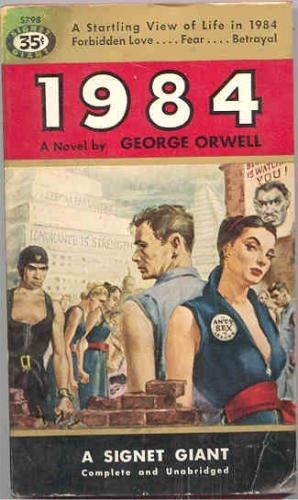George Orwell died on this day in 1950. This article, from Index on Censorship magazine (volume 42,no 3), looks at one legacy he may not have liked.
Subscribe to Index on Censorship magazine here
The revelation that US intelligence services have allegedly been monitoring everyone in the entire world all the time was good news for the estate of George Orwell, who guard the long-dead author’s copyright jealously.
Sales of his novel Nineteen Eighty-Four rocketed in the United States in June as Americans sought to find out more about the references to phrases such as “Big Brother” and “Orwellian” that littered discussions of the National Security Agency’s PRISM programme.
The Wall Street Journal even went so far as to describe this profoundly bleak novel as “one of the hottest beach reads this summer”. And web editors, hankering after a top ten Google ranking for their articles, quickly commissioned articles on the Orwellian theme.
Meanwhile, news website Business Insider published a plot synopsis that managed to run through the events of the book without describing what the book was about at all. The nadir of this frenzy was reached by an Associated Press correspondent, who wrote of his “Orwellian” experience of being stuck airside at the same Moscow airport as whistleblower Edward Snowden for a few hours (for added awfulness, an editor’s note on the piece suggested that this deliberate exercise in boredom was “surreal”).
Nineteen Eighty-Four (not 1984) has become the one-stop reference for anyone wishing to make a point. CCTV? Orwellian. Smoking ban? Big Brother-style laws. At the height of the British Labour Party’s perceived authoritarianism while in government, web libertarians squealed that “Nineteen Eighty-Four was a warning, not a manual”.
It was neither. It’s a combination of two things: a satire on Stalinism, and an expression of Orwell’s feeling that world war was now set to be the normal state of affairs forever more.

A brief plot summary, just in case you haven’t taken the WSJ’s advice on this summer’s hot read: Nineteen Eighty-Four tells the story of an England ruled by the Party, which professes to follow Ingsoc (English Socialism). Winston Smith, a minor party member, thinks he can question the totalitarian party. He can’t, and is destroyed.
While Orwell was certainly not a pacifist, descriptions of the crushing terror of war, and the fear of war, run through much of his work. In 1944, writing about German V2 rockets in the Tribune, he notes: “[W]hat depresses me about these things is the way they set people off talking about the next war … But if you ask who will be fighting whom when this universally expected war breaks out, you get no clear answer. It is just war in the abstract.”
It’s hard for us to imagine now, but Orwell was writing in a world in which the Universal Declaration of Human Rights was not yet formulated, and where the Soviet Union seemed unstoppable. Orwell had long been sceptical of Soviet socialism, and for his publisher Frederic Warburg Nineteen Eighty-Four represented “a final breach between Orwell and Socialism, not the socialism of equality and human brotherhood which clearly Orwell no longer expects from socialist parties, but the socialism of Marxism and the managerial revolution”. Warburg speculated that the book would be worth “a cool million votes to the Conservative party”.
This is the context in which Nineteen Eighty-Four was written, and the context that should be remembered by anyone who reads it.
But too often it is imagined there is a “lesson” in Nineteen Eighty-Four as, drearily, it seems there must be a lesson in all books. There is not. The brutality of Stalinism was hardly a surprise to anyone by 1949. The surveillance, the spying, the censorship and manipulation of history were nothing new. Orwell was not so much warning that these things could happen as convinced that they would happen more. He offers no way out, no redemption for his characters. If this book were to have a lesson, Winston would prevail in his fight against the Party; or Winston would die in his struggle but inspire others. We would at least get far more detail on the rise of Ingsoc (the supposed secret book Winston is given, The Theory and Practice of Oligarchical Collectivism, goes some way in explaining how the Party rules, but doesn’t really explain why it rules). As it is, we get an appendix on the development of “Newspeak”, the Party’s successful project to destroy language and, by extension, thought. This addition is designed only to assure us that the Ingsoc system still thrives long after Winston has knocked back his last joyless Victory gin.
There is no system in the world today, with the possible exception of North Korea (which has barely changed since it was founded just after Nineteen Eighty-Four was published), that can genuinely be said to be “Orwellian”. That is not to say that authoritarian states do not exist, or that electronic surveillance is not a problem. But to shout “Big Brother” at each moment the state intrudes on private life, or attempts to stifle free speech, is to rob the words, ideas and images created by Orwell of their true meaning – the very thing Orwell’s Ingsoc party sets out to do.
This article was posted on 21 January 2014 at indexoncensorship.org





